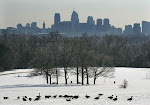The ALCTS conference continued for the second day and was held at the Federal Trade Center. You can tell from the picture that this is an impressive building and was a great place for our meetings.
My day started early with a 15 block walk in a beautiful 65 degree morning. Stopped at Starbucks, so felt very "Metro" walking in to "work" with everyone else who was carrying their Starbucks cups.
The first speaker of the day was David Lankes who some of you heard speak at our Amigos conference. He talked about "Collecting conversations in a massive scale world". He recently put together a study for our community on "Participatory Networks: the library as conversation". Prof. Lankes gave us a lot to think about in a short talk. He started with an example of the massive amount of information that is around us now by taking a look at the Department of Transportation. If you think of all the data that is involved in road sensors, real-time traffic data, weather info, toll data, etc; soon every mile of road will generate a gigabyte of data a day. Yikes, that's just about road information and it is growing exponentially. The role of the library and librarians was a focus point highlighting the current difference in our text based world and tools vs. the growing amount of non-textual information (living documents, images, sound, etc). We must become part of the conversations. Place as Library, not Library as Place. I'll write up more of my notes and share them later. We had break out sessions after each speaker and these were very productive discussions. It was so helpful to hear other libraries and how they were looking at all these issues.The next speaker was the director of preservation at the Library of Congress. Dianne Van der Reyden. She basically gave us a tour of their projects and processes. Frank, they call one of their services "Custom-made housing". I thought that was a nice way of labeling what you do with phase boxes, etc., so maybe we could use that term. Another cool thing they are beginning to play with is "Haptic training" with computer simulation. I believe this is the work with a tool on a fragile document, like a razor to scrap -- they hook themselves up to this computer which "traces" their movements. This machine can then be used later as training for others, the machine then moves a persons hand in the movement of the expert. Okay, so I obviously didn't quite get it, but found it interesting. Another new area is digital preservation. The director is working with some biologists and their work with dna as a possible way to track digital information through its evolutions since dna is a Base 4 and our computers work with a Base 2 model. Okay, so that was a little over my head too, but 4 is more than 2; so I get that! : )
The last speaker was Stephen Abram, who was very interesting. I have 4 pages of notes listing things we need to think about. I did come away convinced that we need to get all our staff aware of the 2.0 technologies so we are ready to move forward. A final quote from his presentation: "Librarians must learn that when we study something to death, Death was not our original goal." : )
This was a great conference and I met some very sharp and creative tech services leaders. I have a lot to share when I get back.






No comments:
Post a Comment